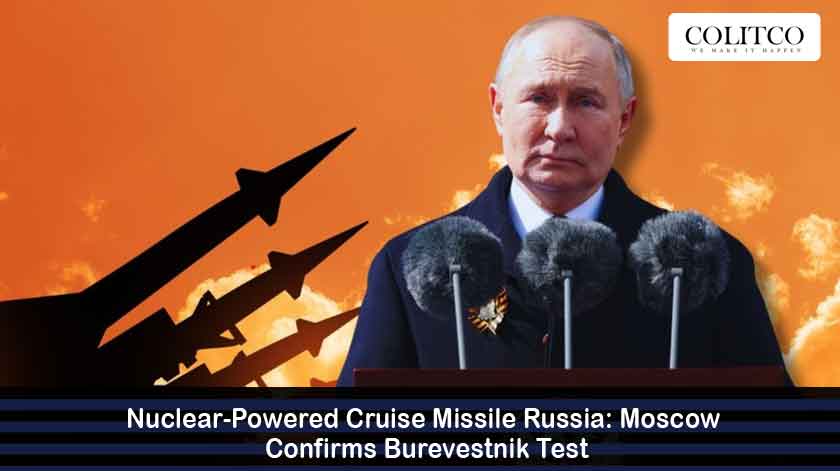Russia has officially announced the successful testing of a nuclear-powered cruise missile, called the Burevestnik. President Vladimir Putin disclosed that the test flight was approximately 14,000 kilometres long and lasted around 15 hours. He characterised the missile as a “one-of-a-kind weapon with no competition anywhere in the world.”
The testing of the Burevestnik missile in Russia means that Moscow has again set its sights on reinforcing its long-range nuclear retaliation capacity. The test, which was publicly acknowledged, is a clear indication that Russia still invests heavily in cutting-edge nuclear technology, notwithstanding international pressures.

Russia successfully tested its 14,000-km, 15-hour Burevestnik missile.
Why Is The Russia Burevestnik Missile Test Significant?
The Burevestnik missile, which is also known as the 9M730 or SSC-X-9 “Skyfall,” denotes a revolution in nuclear deterrence. The missile has no limits in range, and it’s a compact nuclear reactor that drives it instead of ordinary fuel.
The Russian authorities assert the armament is capable of slipping through every missile-defence system existing today, as it follows an erratic trajectory. Consequently, it can be said that no country has the means to intercept it at the moment. The Burevestnik missile news from Putin has led to different interpretations among the defence experts, with some considering the trial as a communication to NATO and the U.S.
How Does This Development Affect Global Security?
Military specialists all over the world think that the recent test can lead to a change in the world power configurations. The achievement by Russia in the field of a nuclear-powered cruise missile tends to increase the possibility of an arms race among the countries that are equipped with the latest technology in weapon systems.
Countries such as the US and China, among others, have already started to work on their hypersonic and nuclear-capable platforms. Besides, the test has generated environmental issues because of the dangers involved in the operation of airborne nuclear reactors. On the other hand, the Kremlin acknowledges that there were no safety lapses during the launch. The world community remains careful and is calling for new talks about arms control.

Experts say Russia’s missile test may trigger a global arms race.
Russia Moves Toward Deployment Phase
President Putin has ordered the military to get ready the infrastructure for the Burevestnik missile deployment. This action is a sign that the system might be on the verge of being operationally used. Russia disclosed this project for the first time in 2018 when the US left the 1972 Anti-Ballistic Missile Treaty.
From that point on, it has been a key element in Moscow’s deterrent strategy modernisation. The missile can fly for a long time, which means it can stay in the air for hours or even days, possibly going around the world before attacking. Some experts think that this feature might alter the nature of long-range conflict altogether.
Message To The West And Strategic Outlook
Russia’s announcement of testing the nuclear-powered cruise missile has a very powerful message for the West. It signifies that Russia is determined to keep an equal footing with Western military advancements.
Putin’s statement at the time of the announcement was a strong signal of Russia’s self-sufficiency and durability in the face of sanctions and geopolitical pressures. The test, even as the war in Ukraine is going on, has made Moscow’s desire to be seen as a strong power everywhere more apparent.
Western intelligence services will likely keep a close watch on any future activities related to the missile, including its deployment or further tests.

Russia’s missile test signals determination to match Western military power.
Implications For Defence Markets And Investors
The Burevestnik missile test in Russia might have an impact on the global defence markets. Countries could decide to invest more in anti-missile technology in order to counter such long-range systems. The manufacturers of sensors, radars, and interceptors could experience a rise in demand.
On the other hand, geopolitical uncertainty might have an adverse effect on energy and commodities markets that are connected with military production. The test also adds a burden to future arms-control negotiations, which are still not clear. Expert opinions suggest that the military budgets around the world might increase as the nations review their weaknesses in the face of Russia’s technological advances.
Also Read: Russian Terror Attack Inflicts $4 Billion Blow on Global Car Maker
Frequently Asked Questions
Q1: What Is The Burevestnik Missile?
The Burevestnik is a nuclear-powered cruise missile developed by Russia, which is aimed at having an unlimited range and global reach.
Q2: How Does A Nuclear-Powered Missile Work?
A small nuclear reactor is the propulsion source, which means that the missile can fly for a long time without the use of traditional fuel.
Q3: Why Is This Test Important?
It displays the technological progress of the nuclear-capable arms, and it is a challenge to the existing missile-defence systems throughout the globe.
Q4: What Are The Risks Of Such Weapons?
If a nuclear-powered missile crashes or malfunctions, radiation hazards and environmental impacts are the major concerns.












